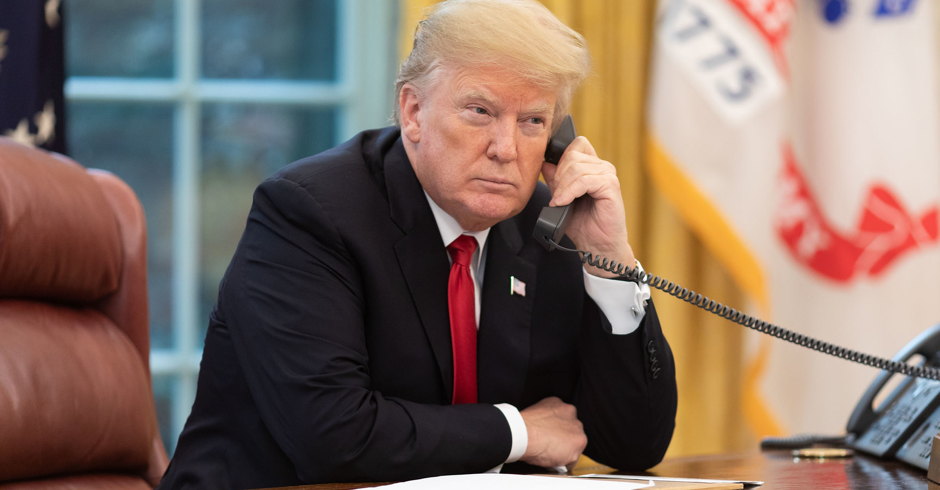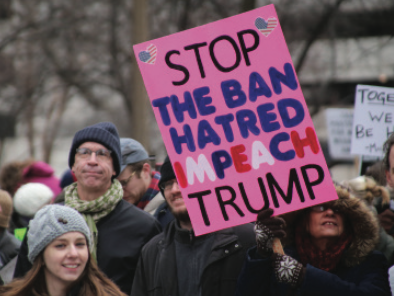On Sept. 24, House Speaker Nancy Pelosi announced a formal impeachment inquiry against President Donald Trump for using his political power for personal gain. This impeachment inquiry resulted from a whistle-blower letter, detailing a phone conversation that was described as “frightening” by a White House official.
“The actions taken to date by the president have seriously violated the Constitution,” said Pelosi in an article for The New York Times, “[Trump] must be held accountable — no one is above the law.”

The first whistle-blower came forward on Aug. 12 and released a sixteen paged letter describing a phone call between President Trump and the President of Ukraine, Volodymyr Zelensky. The complaint was written by an intelligence officer and was addressed to Chairman Richard Burr, Select Committee on Intelligence of the United States Senate; and Chairman Adam Schiff, Permanent Select Committee on Intelligence of the United States House of Representatives.
The letter details evidence against Trump, who is alleged to have used his political power to withhold aid from Ukraine to negotiate for access to information. Trump requested information concerning former Vice President Joseph Biden and his son Hunter Biden. Hunter Biden is a chair holder of Burisma Holdings, a Ukrainian energy company.
The 30-minute phone call between Trump and Zelensky took place on July 25. While the full document of the conversation that transpired is available for public access, the document itself states that the transcription may not be “verbatim,” or not containing the exact words used in the original conversation.
“In the course of my official duties,” said the intelligence officer in the first page of the whistle-blower complaint, “I have received information from multiple U.S. Government officials that the President of the United States is using the power of his office to solicit interference from a foreign country in the 2020 U.S. election.”
While the intelligence officer was not a direct witness to most of the phone conversation, they found their colleagues’ recollections of these events to be credible, as the accounts of a number of other officials of President Trump were consistent with one another.
Initially, access to the documentation of the phone conversation was restricted. The transcript of the conversation was directed by White House lawyers to be removed from the computer system that typically stores such documents. It was moved to a separate computer system typically utilized to house classified information of an especially sensitive nature.
The document was not declassified by Trump until September 24, the same day othe official impeachment inquiry was announced by Pelosi, and almost two months after the initial conversation had transpired. Trump declassified the transcript allegedly as a defense tactic, to show that he had a “perfect conversation” with Zelensky.
According to the transcription of the phone call, in the early stages of the conversation, President Trump congratulated President Zelensky on obtaining his presidency. Zelensky replied to this compliment by stating that he himself had the opportunity to learn from Trump and that he utilized some of Trump’s skills and knowledge.

After the exchange of pleasantries are made, Trump began to remark on the current relationship between Ukraine and the United States.
“The United States has been very very good to Ukraine. I wouldn’t say that it’s reciprocal necessarily because things are happening that are not good but the United States has been very very good to Ukraine,” Trump said.
As the conversation progressed, President Zelensky mentioned that he would like to purchase Javelins from the United States for defense purposes, to which President Trump replied that he would like the Zelensky to do him a favor.
According to the transcription, Trump requested information about Joe Biden and his son, Hunter Biden. To secure this information from Zelensky, Trump insinuated withholding security aid from Ukraine.
In an interview with NPR, Ex-U.S. Ambassador to Ukraine, John Herbst, spoke about the “normality”, or rather the lack thereof, surrounding the call between Trump and Zelensky.
“This is highly abnormal…The U.S. Congress had voted $250 million of military assistance to Ukraine. And this thing seemed to be on track,” Herbst said. “And suddenly, it was held up in the middle of July. And that was the backdrop to that phone call.”
As Ukraine currently is facing a military threat from Russia, the $391 million in funding from the U.S to Ukraine is currently frozen. The funding is a vital resource for Ukraine as a means to protect itself from Russia. However, the Trump administration states that the freezing of funds to Ukraine was not a result of the phone call, but something that happened prior to Trump’s conversation with Zelesky.
Based on the information that surfaced, Speaker Pelosi presented the first official impeachment inquiry against President Trump. Impeachment is the process of removal of a president if their actions are deemed to be evidence of “treason, bribery, or other high crimes and misdemeanors.”
On Oct. 8, Pat A. Cipollone, Counsel to the President, released a formal response to the impeachment inquiry. In the letter addressing the House Democrat leaders, Cipollone described their impeachment inquiry as “illegitimate”.
“I write on behalf of President Donald J. Trump in response to your numerous, legally unsupported demands made as part of what you have labeled — contrary to the Constitution of the United States and all past bipartisan precedent — as an ‘impeachment inquiry,’” Cipollone said in the first page of the White House response to the impeachment inquiry.
Cipollone, as he continued to write on behalf of President Trump, suggested that the impeachment inquiry is nothing more than an attempt by the Democratic party to influence the next election.
“Many Democrats now apparently view impeachment not only as a means to undo the democratic results of the last election,” said Cipollone, “but as a strategy to influence the next election, which is barely more than a year away.”
Cipollone continued and furthered the argument that the impeachment inquiry is unconstitutional because of its “baseless” accusations of the President’s actions regarding the nature of the phone call. Cipollone also stated that not only did President Trump do nothing wrong, but that the administration would not participate in the impeachment inquiry.
“In order to fulfill his duties to the American people, the Constitution, the Executive Branch, and all future occupants of the Office of the Presidency, President Trump and his Administration cannot participate in your partisan and unconstitutional inquiry under these circumstances.”
As the impeachment inquiry continues, with or without the participation of Trump and his administration, opinions surrounding the call will not be stonewalled.
“To preserve our Constitution, our democracy, our basic integrity, he should be impeached,” former Vice President Joe Biden said during a campaign event. “[Trump has] betrayed this nation.”
